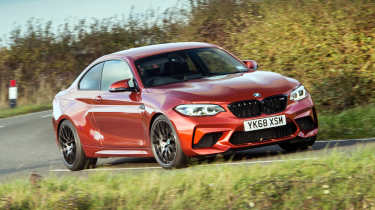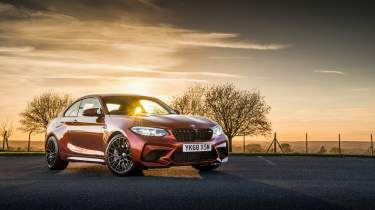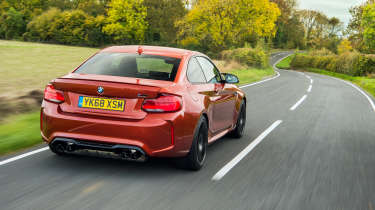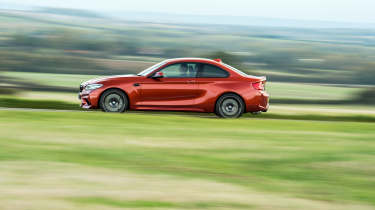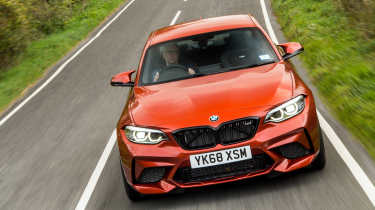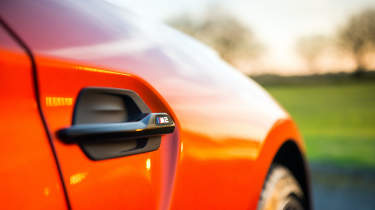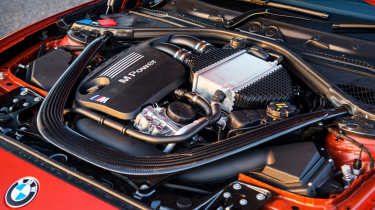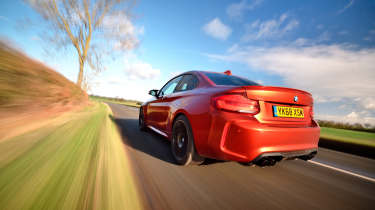Used BMW M2 Competition (F87, 2018 - 2020) review – modern M car great for hot hatch money
Not as ballistic as the M2 CS but the M2 Competition is still brilliant and now remarkably affordable
The ingredients that make an iconic BMW M car are difficult to precisely define, but the M2 Competition, with the significant revisions that improved it compared to the first M2, comes close to being the four-wheeled definition, with its delicious full ‘M’ engine and involving dynamics. That they can now be had for under £30k only compounds our interest.
The BMW M2 was a car that came so close to greatness. With its pugnacious looks, compact dimensions and biddable rear-drive handling it had all the key ingredients to fill that 1M-sized hole in the BMW line-up. Yet while it had the measure of more traditional hatchback rivals such as the Audi RS3 and Mercedes-AMG A45, the M2 never really caught the imagination like it should. Some of the shortfall could be traced to the slightly ragged on-limit handling, the rest to an engine that was effective enough but lacked the fizz expected of an M car.
Happily, both of these areas were addressed in the M2 Competition that replaced the M2 in 2018. For starters, the old M135i N55 3-litre straight-six was ditched in favour of the full-fat twin-turbocharged S55 version from the larger BMW M4 (and M3, of course). There were chassis tweaks that ran to extra strengthening for the bodyshell and stiffer rear axle mounts. To maximise the gains delivered by these tweaks BMW’s engineers also recalibrated both the ESP and the electronically controlled limited slip differential.
More reviews
Group tests
- BMW M3 CS v Litchfield BMW M2: which makes the better track car?
- BMW 230i M Sport v Volkswagen Golf GTI Clubsport
In-depth reviews
Long term tests
Reviews
Together these changes make for a far more desirable machine; one that finally fulfils the early promise of the original. The engine now sounds as good as it goes, while the extra precision in the chassis allows you to better exploit the M2’s natural balance. With over 400bhp on tap, a short wheelbase and just over 1500kg to lug around the M2 Competition was an enthralling machine to drive but was still remarkably practical with room for four and a fair bit of luggage, too.
BMW M2 Competition in detail
There wasn’t a huge amount wrong with the original M2 that made its debut in 2016, but like its 1M coupe precursor it lacked a full-fat M engine and didn’t offer the on-limit fluidity expected of a full-fat M car. If you can’t stretch to an M2 Competition it’s still worthy of consideration and its N55 straight-six is still a peach of an engine.
In updating the M2 BMW looked to the larger M4 for inspiration, and parts. It would have been all too easy to simply treat the M2 to a light facelift, but BMW’s M Division doesn’t do things by halves and instead its entry-level motor was subjected to a full-on heart transplant. Out went the old M135i based engine and in came the glorious S55 motor, with its twin-turbos, ‘closed deck’ block, lightened crankshaft, enhanced cooling system, strengthened pistons and all. There was a new exhaust system too, complete with de rigueur active bypass valves for a more bombastic soundtrack. Despite this some owners upgrading from an M2 to the Competition model did mourn the purer sound of the earlier car as the Comp was definitely louder, but less cultured.
The updated engine delivered 404bhp and 406lb ft – increases of 39bhp and 37lb ft respectively over the M2. The M2 Competition was still 40bhp shy of the contemporary M3 and M4 Competition models (torque was the same) as BMW didn’t want the entry-level M car treading too closely on the toes of its more expensive siblings. As with the original M2, drive went to the rear wheels either through a six-speed manual gearbox or an optional seven-speed DCT twin-clutch.
While the manual was undoubtedly the purist’s choice the vast majority of buyers went for the seven-speed ‘box but despite its occasionally notchy shift action the six-speed manual delivered a welcome extra layer of driver interaction. The DCT was fast and effective, but it could sometimes thud home ratios, upsetting the car’s composure and tended to be a little clonky when manoeuvring at low speeds. There was a new rev-match system for downshifts on the manual, but it could be disabled by either switching off the ESP or by rummaging through the various driver settings.
As you’d expect from such a big engine in such a relatively small body, the performance was startling. The benchmark 0-62mph sprint was dealt with in 4.2sec (4.4sec for the manual), while top speed was 174mph if you stumped up for the optional M driver’s package. In fairness those performance figures weren’t streets ahead of the original M2, but what changed was the way it delivered the goods – and it was very much for the better. It pulled from low down with the same lag-free muscle of the old unit, but it now had a hunger for revs, eagerly spinning around to 7500rpm redline with a lovely mechanical growl and just a hint of turbo whistle. It was enough to make Porsche 718 Cayman owners weep. It’s an engine you wanted to wring out time and time again just for the hell of it.
While the M2 Competition’s underpinnings were very similar to the M2’s, both cars already having been treated to the M4’s front and rear suspension assemblies, the Competition received some additional M4 goodness. The bigger car handed over its carbonfibre front strut brace and bulkhead brace, increasing rigidity and therefore delivering more precise and accurate steering. Elsewhere, the multi-link rear axle received ball joints in place of the old car’s rubber bushes, while both the electronically controlled rear differential and the stability control were treated to some digital development to cope the car’s greater agility. The springs and dampers were brought over unchanged from the previous model. Like the M2 there was no option to upgrade to adaptive dampers, BMW again wanting to keep some differentiation between the baby M car and the M3/M4.
In another move to keep the models separated the M2 wasn’t available with the carbon ceramic brakes that were an option on the bigger M cars but made do instead with more or less the same stoppers as the M2 was equipped with – 380mm front discs and four-piston calipers. Many owners found these to be a little marginal, especially if used on track, and there was a £1350 BMW M Performance upgrade which featured larger 400mm front discs with six-piston calipers.
Externally, the M2 Competition was still very much an M2 but with added attitude. It had a larger, more aggressive looking grille, and a front bumper that features larger air intakes to feed the upgraded cooling system. There was also gloss black treatment for some of the trim and the rear badge. Elsewhere the M2 Competition could be identified by its M double-arm door mirrors, larger exhausts and an additional inch for its alloys. The M2 made do with a set of stylish 18-inch items but the M2 Competition received a set of slightly fussy 19-inch items, nine-inches wide at the front and 10-inches at the rear.
One of the criticisms levelled at the original M2 was that it’s interior was just a little bit too ‘2-series’, and didn’t look all that different to one you’d find in a 218d. For the M2 Competition there were a few additional touches to make it feel more special, mainly the adoption of the same high-backed seats used in the M3 and M4 (complete with illuminated badges in the backrests) and a smattering of extra buttons on the transmission tunnel to tailor the steering and throttle individually, just like on the other M cars.
What we said
‘We hit the track first and you notice the improvements almost immediately. For starters, the body strengthening has done the trick. The already meaty steering now feels more precise, the front end responding crisply to your instructions. Traction is strong out of the slower corners, while through the faster turns there’s beautiful balance, the subtle stabilising understeer easily neutralised with a stab of the throttle. Switching off the stability control reveals a car that can be steered as effectively with your right foot as it can with the steering, the stiffer rear axle and tweaked diff delivering a more faithful and progressive breakaway. At the end of our stint the only demerit is the grumbling of brakes – although they still stopped the M2 effectively.
‘On the road there’s the same underlying firmness as the old car, the BMW jiggling in rhythm with the road at low to medium speeds. Yet pick up the pace and this tautness is your ally, helping to keep the Competition’s cornering stance flat and tightly controlling body movements – only over a short but wickedly bumpy stretch does the short wheelbase M2 get unruly.
‘At saner speeds there’s virtually no front end slip, which gives you confidence to commit from the moment you turn the wheel. Yet there’s still plenty of scope for it to show its playful side, the combination of stump-pulling torque, sharp throttle and newfound precision in the rear axle allowing you either to revel in strong traction or to gently rotate the car at corner exit.’ – James Disdale, evo 252, October 2016
7515 miles in a BMW M2 Competition
'Eight months with a compact, 404bhp M-car. It’s a no-brainer, right? You’re going to have a good time. Well, when our M2 Competition arrived, I was far from sure.
'Concern number one was that I’ve never really been that enamoured with the F8X M3/M4, and in particular its turbocharged engine, which made its way into the revised M2. Concern number two was that the first M2 was something of a hit-and-miss machine, and while the initial tests suggested this revised Competition variant had addressed many of the original’s shortcomings, could long-term exposure on a wider range of roads once again expose a chassis that struggles just when you need it to pull together? Time would tell.
'Things got off to a good start, chiefly because our M2 had a manual gearbox, not the DCT option. The manual shift immediately endowed the ‘S55’ engine with more character than I recalled from the various current-gen M3s and 4s I’d driven – all of them DCTs – principally because it seemed more natural to hold individual gears over a greater stretch of the rev range rather than flicking them away with the twitch of a finger. In combination with a 40bhp reduction in power, and the identical 406lb ft peak torque figure arriving 500rpm later, at 2350rpm, the spiky delivery that can be tiresome in the next model up the M-car ladder was also suitably tamed.
'Our relationship soon started to blossom, but then winter arrived and things took a step backwards. On cold, wet roads, I found the M2’s front end frustratingly difficult to read, so my pace was often inordinately tempered by not knowing how much grip I had in reserve. Others on the evo team found they could work around it, but I could never get comfortable taking that leap of faith.
'So spring couldn’t come soon enough. With milder temperatures and dry surfaces, front-end grip levels were obvious and plentiful again, while the rear end did a remarkably good job of getting all of that torque to the tarmac via 265/35 ZR19 Michelin Pilot Super Sports. The twin-turbo straight-six was now fully run-in, too, and fed on 99 RON its performance packed a hefty punch. Stretching each of the lower gears out to the 7500rpm red line, not once did I think the M2 needed its bigger brothers’ extra horsepower. In fact, at one point I actually checked the Knowledge to make sure the Competition’s power figure wasn’t higher than I remembered…
'It was around this time that I really began to bond with the M2. In fact, that’s understating it; it really felt more like a mild addiction. I lost count of the number of times I drove my favourite sections of the B660 just for the sake of it. The M2’s size suited said road so well, being compact enough to not feel like you were threading it through the eye of a needle as you avoided the ragged tarmac edge to your left and the catseyes and occasional oncoming traffic to your right. And though you could be shaken up and down quite vigorously at times, crucially this happened not because the car was pogoing on the edge of control, as was often the case with the original M2, but because the taut-riding Comp was moving in close sync with the road beneath, keeping itself in check.
'So those were the fun times; what about the day-to-day? It certainly wasn’t one of those cars that mollycoddled you on regular journeys: with its manual gearshift, manual handbrake, no blind spot warnings, no radar for the cruise control, no adaptive dampers, etc, you were encouraged to remain involved and alert. But it also had all the good nice-to-haves: reliable satnav, a reversing camera (optional), a decent 12-speaker Harman Kardon sound system, and amazingly bright adaptive headlights (those last two being part of the £1800 ‘Plus Pack’).
'Passengers would complain about the harsh ride around town, and accessing the rear seats could be a pain, because the seatbacks insisted on bouncing back to their upright position quite forcefully unless you kept pushing them forward, and because waiting for the (optional) electrically powered seat base to whir slowly forwards was a bore.
'The M2’s mpg generally hovered around the mid-20s, which seemed acceptable given how often its performance was enjoyed. There wasn’t a single glitch, blip, knock or rattle to report, and when the car left us with 8600 miles on the clock, its first service was still over 10,000 miles away. And there was around 7mm of tread left on the front tyres, 4mm on the rear.
'The M2 Competition may have taken its time to fully worm its way into my affections, but when it eventually did, I was hooked. Its departure at the start of the summer – when to my mind its abilities are shown at their best – seemed impossibly cruel. I truly miss it.' – Ian Eveleigh, 2019
What to pay and buying guide
When it was new the M2 Comp was a whisker under £50k and the good news is that you can now bag one for around half that. At £25k you’ll be looking at an early car with highish miles but stretch a little more and £30k will get a 2018 or 2019 example with reasonable mileage. Top whack for an M2 Competition is around the £40k mark which will see you in a 2020 machine with low miles and plenty of options.
Cars at BMW main dealers start at about £30k and do offer peace of mind as they’ll come with 12 months approved used car warranty which will cover any major failures. If you’re after a manual example then you might have a little bit more trouble finding one as the seven-speed DCT ‘box outsold the six-speed manual by quite some margin. As a result the manual cars carry quite a price premium, as much as £5000.
Overall the M2 Competition has a decent reliability record but there are a couple of issues that can crop up. Electrical glitches aren’t unknown with the iDrive occasionally failing to respond to inputs or randomly operating of its own accord. The rear indicators can also play up which is a common BMW 2-series problem. The cabin can also succumb to a few squeaks and rattles with the worst generally coming from the glovebox area.
Differential seals, particularly the input seal and the sensor, can be prone to leaks and coolant radiators at the front can be punctured by the plastic wheel arch liners. Bodily there shouldn’t be too many concerns, but do check behind the front and rear wheels for paintwork rash as those 9- and 10-inch wide wheels do spray up plenty of debris which can completely wear through the paint.
Some owners fit arch guards just behind the wheels to prevent this. It’s also worth checking the wheels aren’t damaged, that the tyres are in fine fettle and that the discs aren’t lipped.
Mechanically the main potential weak point in line with some other N55 and S55 engines is the spectre of spun crankshaft hubs. It’s not desperately common and tuned cars are more liable to the fault but if it happens the best-case scenario is that the engine will need retiming while the worst is that the pistons will hit the valves. Our advice would be to arm yourself with a BMW warranty or to invest in one of the aftermarket fixes that address the problem.
BMW M2 Competition specs
| BMW M2 Competition | |
|---|---|
| Engine | In-line 6-cyl, 2979cc, twin-turbo |
| Power | 404bhp @ 5250-7000rpm |
| Torque | 406lb ft @ 2350-5200rpm |
| Transmission | Six-speed manual/seven-speed DCT, RWD, LSD |
| Weight | 1550kg (265bhp per ton) |
| 0-62mph | 4.4sec |
| Top speed | 155mph (limited) |
| Price new | £49,805 |
| Price now | From £25k |
